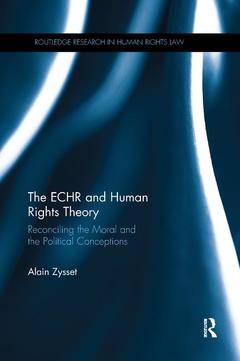The ECHR and Human Rights Theory Reconciling the Moral and the Political Conceptions Routledge Research in Human Rights Law Series
Auteur : Zysset Alain

The European Convention of Human Rights (ECHR) has been relatively neglected in the field of normative human rights theory. This book aims to bridge the gap between human rights theory and the practice of the ECHR. In order to do so, it tests the two overarching approaches in human rights theory literature: the ethical and the political, against the practice of the ECHR ?system?. The book also addresses the history of the ECHR and the European Court of Human Rights (ECtHR) as an international legal and political institution.
The book offers a democratic defence of the authority of the ECtHR. It illustrates how a conception of democracy ? more specifically, the egalitarian argument for democracy developed by Thomas Christiano on the domestic level ? can illuminate the reasoning of the Court, including the allocation of the margin of appreciation on a significant number of issues. Alain Zysset argues that the justification of the authority of the ECtHR ? its prominent status in the domestic legal orders ? reinforces the democratic process within States Parties, thereby consolidating our status as political equals in those legal and political orders.
1. Introduction 2. The Short History of International Human Rights 3. The Long History of (Human) Rights 4.Ethical Theories and Their Practice-Independence 5. Political Theories and Their Practice-Dependence 6.Theorizing Human Rights: A Constructivist Proposal 7. The ECHR in Historical Perspective 8. The Normativity of ECHR Law 9. Interpretation at the ECtHR: Setting the Stage 10. Balancing and Justification at the ECtHR: The Pivotal Concept of ‘Democratic Necessity' 11. Conclusion: Consolidating Sovereignty, Equality and Agency
Alain Zysset is a Max Weber Fellow at the European University Institute (EUI) in Florence, Italy.
Date de parution : 10-2018
15.6x23.4 cm
Date de parution : 10-2016
15.6x23.4 cm
Thèmes de The ECHR and Human Rights Theory :
Mots-clés :
ECHR Right; national; Human Rights; legal; ECtHR Judgments; orders; ECHR Law; fundamental; National Legal Orders; moral; UN; category; International Law; states; Public International Law; parties; Fundamental Moral Category; treaty; Independent Moral Reasoning; bodies; Treaty Bodies; Substantive Moral Reasoning; Supranational Judicial Review; Beitz’s Account; Judicial Practice; Griffin’s Account; Kantian Constructivism; Supranational Judicial; International Legal Norms; Judicial Corporal Punishment; Ordinary Moral Reasoning; Good Life; Global Standpoint; Appreciation Doctrine; Forst’s Account



